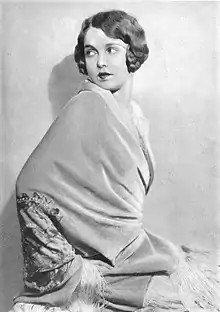Irene Delroy | |
|---|---|
 Irene Delroy Th628 | |
| Born | Josephine Lucille Sanders July 21, 1900 Bloomington, Illinois, U.S. |
| Died | June 14, 1985 (aged 84) Ithaca, New York, U.S. |
| Occupation | Actress |
| Spouse(s) |
W. L. Austin, Jr.
(m. 1921; div. 1937) |
Josephine Lucille Sanders (July 21, 1900 – June 14, 1985), known by her stage name Irene Delroy, was an American stage actress.
Early years
Born Josephine Lucille Sanders,[1] Delroy was the daughter of Mr. and Mrs. Roy Sanders of Bloomington, Illinois.[2] She attended Bloomington High School[3] and University High School.[4]
Career
Delroy's stage debut came when she appeared as a ballet dancer with the Chicago Opera Company.[2] During a visit of that company to New York City in 1920, she left the group to join a fledgling production, A Night Off, in Plainfield, New Jersey. Two weeks after the debut, the inexperienced producers left to return to their former jobs. Delroy returned to Chicago and joined a production of Angel Face, which soon ended during a strike by the Actors' Equity Association.[3]
She made her Broadway debut in the musical revue Frivolities of 1920. She starred in the Greenwich Village Follies from 1923 through 1926 and the Ziegfeld Follies of 1927. She also had leading roles in the musicals Round the Town (1924), Here's Howe (1928), Follow Thru (1929), and Top Speed (1930).[5]
A review of Greenwich Village Follies published in The New York Times on December 25, 1925, noted that Delroy was "radiantly beautiful and sweetly graceful and tuneful" in the production.[6]
Hans J. Wollstein, writing on the AllMovie website, described Delroy as being "completely wasted by the new audible motion picture industry in 1930."[7] She appeared in Oh! Sailor Behave (1930), The Life of the Party (1930), and Men of the Sky (1931).[7]
Personal life
Delroy retired from the entertainment business after marrying[8] W. L. Austin, Jr. on July 15, 1931.[9] He was president of Island Park Associates, Inc., the company that operated Atlantic Beach and part of Rockaway Point.[2] While they were on their honeymoon in Murray Bay, Quebec, Canada, she fell from a horse. Her injuries included "a slight fracture of the skull and slight concussion; a double fracture of a finger, and dislocation of one of the bones about the hip."[10] They were divorced on July 1, 1937.[2]
Filmography
- The Inside of the Cup (1921)
- Oh Sailor Behave (1930)
- The Life of the Party (1930)
- Divorce Among Friends (1930)
- Men of the Sky (1931)
- Sound Defects (1937, short)
References
- ↑ Chalmers, Wilton (January 18, 1931). "Says Irene Delroy is 'The Girl of 1930'". The Morning Call. Pennsylvania, Allentown. p. 16. Retrieved July 14, 2021 – via Newspapers.com.
- 1 2 3 4 "Irene Delroy gets decree". The New York Times. July 2, 1937. p. 25. Retrieved July 13, 2021.
- 1 2 "Who's Who". The New York Times. January 17, 1926. p. X 2. Retrieved July 13, 2021.
- ↑ Gumbrell, Tom (July 4, 1976). "Most photographed woman in the world". The Pantagraph. Illinois, Bloomington. p. F 5. Retrieved July 14, 2021 – via Newspapers.com.
- ↑ "Irene Delroy". Internet Broadway Database. The Broadway League. Archived from the original on November 4, 2020. Retrieved July 14, 2021.
- ↑ "Village Follies has dainty beauty". The New York Times. December 25, 1925. p. 23. Retrieved July 13, 2021.
- 1 2 Wollstein, Hans J. "Irene Delroy". AllMovie. Archived from the original on July 14, 2021. Retrieved July 14, 2021.
- ↑ Lightner p. 140
- ↑ "Irene Delroy in Reno". The New York Times. Associated Press. May 21, 1937. p. 19. Retrieved July 13, 2021.
- ↑ "Irene Delroy hurt". The New York Times. Canadian Press. p. 2. Retrieved July 13, 2021.
Bibliography
- David L. Lightner. Winnie Lightner: Tomboy of the Talkies. University Press of Mississippi, 2016.
- Paul Rayburn and Denise Sampson. Josephine Lucille Sanders “Irene Delroy” Collection. McLean County Museum of History. 2009.